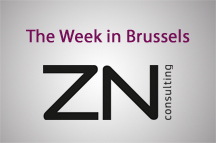 And so, finally, the UK is preparing to pay a bigger divorce bill. While Brexiteers are condemning their government for caving in to EU blackmail, many in Brussels are reminding anyone who will listen they always knew process would prevail over puff: take that, you crazy populists.
And so, finally, the UK is preparing to pay a bigger divorce bill. While Brexiteers are condemning their government for caving in to EU blackmail, many in Brussels are reminding anyone who will listen they always knew process would prevail over puff: take that, you crazy populists.
However, some realise this is an own goal. Of course, the whole Brexit saga is working very well at striking fear into those remaining. But if only fright is keeping the EU together, it might as well accept it is indeed the EUSSR of British legend.
Calls for the EU to communicate better probably predate its founding. In more recent memory there was a Commissioner for Communication, but she never quite recovered from the Constitution debacle. Then came Viviane Reding and her citizen dialogues, which also earned the right to be forgotten. Every Eurocrat wanting to talk up EU benefits has free roaming on speed dial, but they still find it tough to get in touch with actual people.
Shelves in Europe’s capital creak with books about the problem. A recent publication, Rebranding Europe by Stavros Papagianneas (ranked by ZN and EURACTIV as a top-40 #EUinfluencer) considers the EU fails to deliver when it comes to communication at national, regional, European and global level. He recommends making “messages coherent, clear, concrete and jargon-free, and connecting them to particular human needs and expectations. Speaking with one voice at all levels…”
Seems straightforward enough… Oh, wait. Organisations don’t communicate – people do. And only successfully if they do it in their own voices. That is a much bigger challenge for European institutions than publishing platitudes across all social media channels, which, to be fair, they do too often and extremely well.
 So what is the solution? Prepare to be shocked. As a winning column by a Berlin postgraduate for the recent FT Future of Europe Project put it: “Liberals may scoff at his seemingly inane Twitter feed — yet the US president manages to maintain a direct line to his core voters.”
So what is the solution? Prepare to be shocked. As a winning column by a Berlin postgraduate for the recent FT Future of Europe Project put it: “Liberals may scoff at his seemingly inane Twitter feed — yet the US president manages to maintain a direct line to his core voters.”
Facts no longer matter – just check out the anti-science movements. No, it’s who’s shouting loudest who carries the day. We need resonant voices shouting for Europe. Individuals who can rise above national visions yet maintain that vital connection with their compatriots, the authenticity so many lose in the Brussels bubble. Strong opinions given without fear of giving offense, as opposed to the polite ambiguity of what remains essentially a diplomatic community. What we need are more speeches like that of MEP Esteban González Pons, which reached millions of people earlier this year.
In other news, Macron tweeted on Tuesday calling for French to become the leading language in the world. Although this might be a good example of how politicians shout out their message these days, this might not be best the way to change the conversation on Europe.
Only [insert your favourite populist] can make claims like that with sufficient passion and lack of substance. Thankfully, the EU probably does have a future, but we need to make that probability higher by proclaiming it with more PASSION and hopefully some substance!
Let me know your thoughts and what you disagree with via Twitter or LinkedIn.














